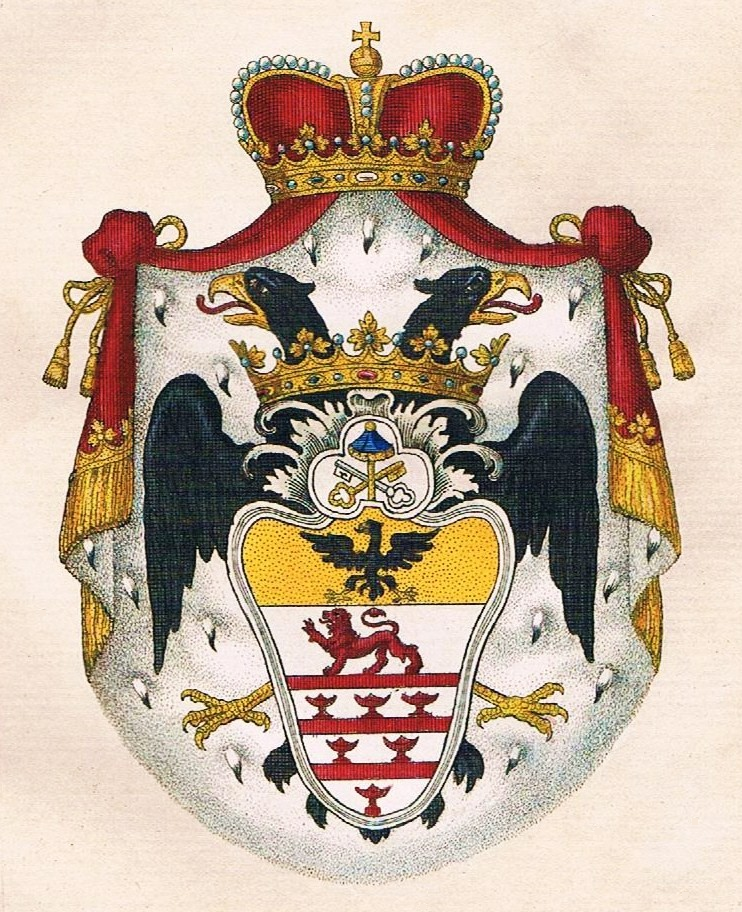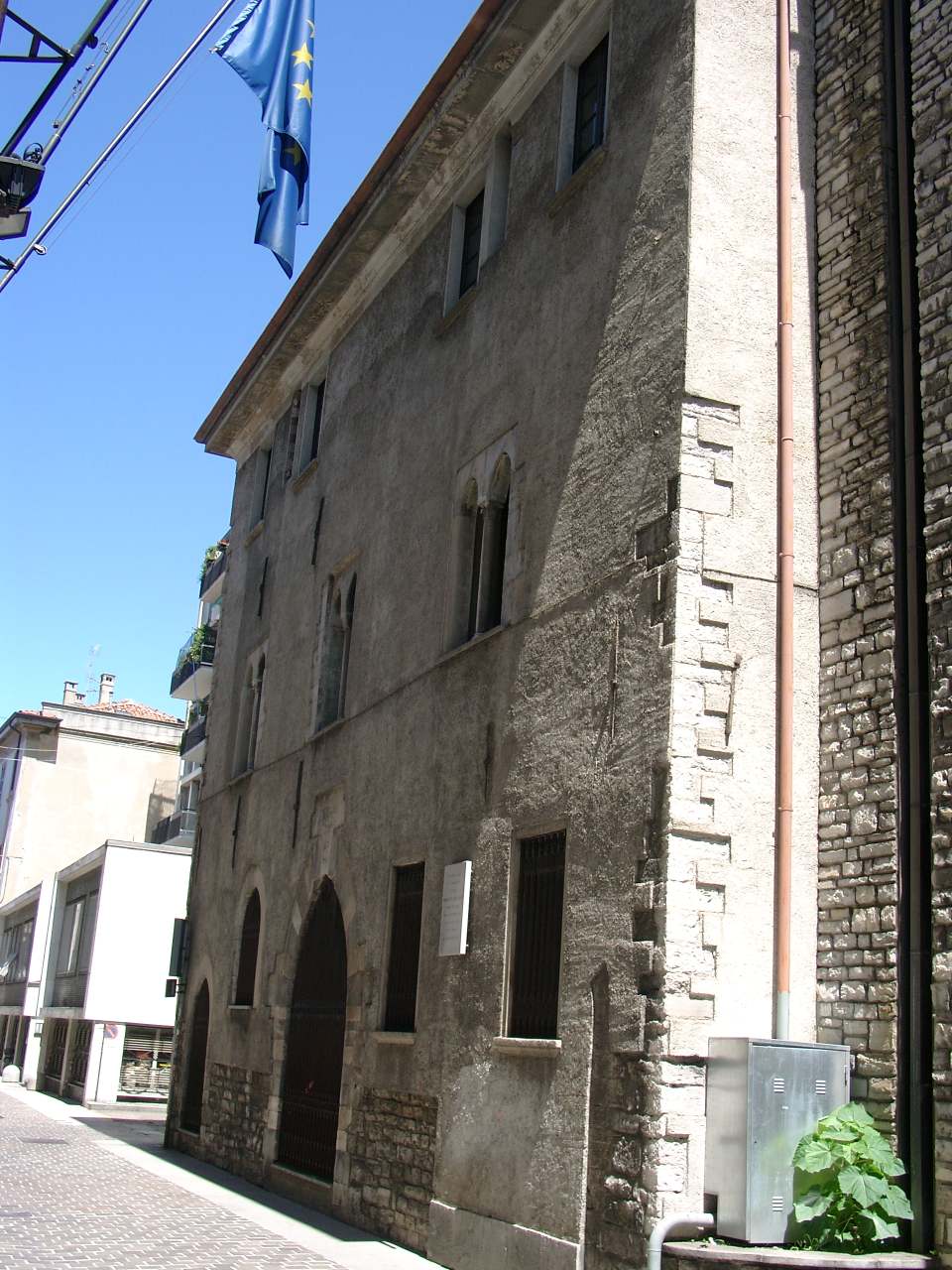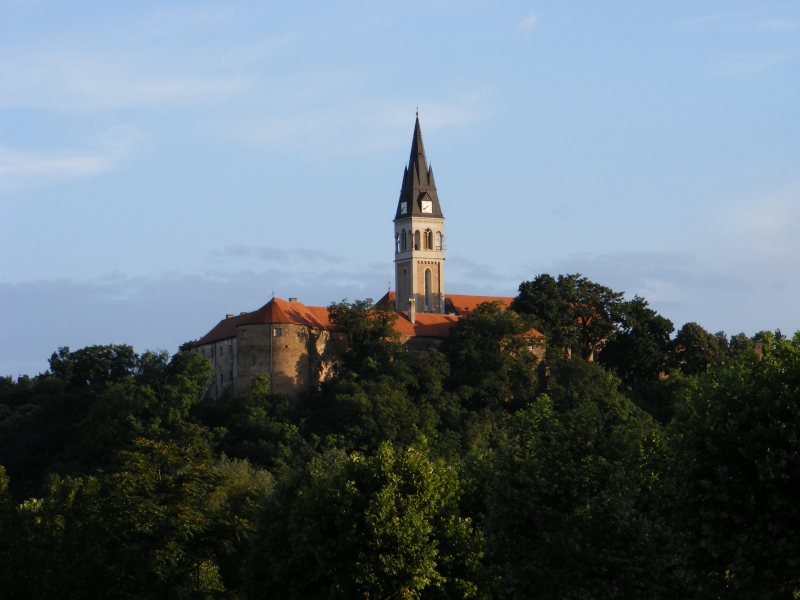|
Erba-Odescalchi
The House of Erba-Odescalchi () and the House of Odescalchi are branches of an Italian nobility, Italian noble family formed by the union of the Erba and Odescalchi families. The Odescalchi family was, since the election of Benedetto Odescalchi as Pope Innocent XI in 1676, part of the highest Roman aristocracy. Odescalchi family The Odescalchi family were entrepreneurs from the minor nobility of Como. They trace their family line to Giorgio Odescalchi of Como, born around 1290. Pietro Giorgio Odescalchi was Roman Catholic Diocese of Alessandria, Bishop of Alessandria (1598–1610) and then Roman Catholic Diocese of Vigevano, Bishop of Vigevano (1610–1620). In 1619, Benedetto's brother and three uncles founded a bank in Genoa, which grew into a successful money-lending business. After completing his studies in grammar and letters, the 15-year-old Benedetto moved to Genoa to take part in the family business as an apprentice. The family established lucrative financial transa ... [...More Info...] [...Related Items...] OR: [Wikipedia] [Google] [Baidu] |
Livio Odescalchi
Livio Odescalchi (March 10, 1652 - September 8, 1713), Duke of Bracciano, Ceri and Sirmium, was an Italian nobleman of the Odescalchi family. Livio Odescalchi was born in Rome in 1655, the son of Carlo Odescalchi (1607-1673) and Beatrice Cusani. His paternal uncle was Benedetto Odescalchi, who was elected to the papacy as Pope Innocent XI in 1676. Since Innocent wanted to put an end to the established Cardinal-nephew, nepotism of the Roman Curia, Curia, he did not make his nephew a cardinal, but instead granted Livio his own personal fortune of some forty thousand crowns, and conferred upon him his own title as Duke of Ceri in 1678. Livio was however eventually made Gonfalonier of the Church, Gonfaloniere and Captain General of the Church by his uncle. Livio later helped Innocent finance the expedition led by John Sobieski that ended the Turkish siege at the Battle of Vienna in 1683. Odescalchi himself fought with distinction in the battle, and was made an Princes of the Holy Ro ... [...More Info...] [...Related Items...] OR: [Wikipedia] [Google] [Baidu] |
Carlo Odescalchi
Carlo Odescalchi, (5 March 1785 – 17 August 1841) was an Italian prince and priest, Archbishop of Ferrara, cardinal of the Catholic Church and Vicar General of the Diocese of Rome. For years a close collaborator of popes Pius VII and Gregory XVI, in 1838 he renounced his titles in order to become a Jesuit. Early life A relative of Benedetto Odescalchi, who reigned as Pope Innocent XI from 1676 until 1689, Carlo was born in Rome, the second son of the noble Baldassare Erba-Odescalchi, a Prince of the Holy Roman Empire and Duke of Syrmia in the Kingdom of Hungary, and his wife Valeria Caterina Giustiniani, who also belonged to a family of nobles. Carlo was first educated at home by his father, but from 1798 to 1800 studied in a seminary in Hungary, where the family lived for a time in exile after fleeing from the invading armies of the French First Consul Napoleon Bonaparte. He had received the clerical tonsure in 1797 and was eventually ordained to the priesthood on 31 Dec ... [...More Info...] [...Related Items...] OR: [Wikipedia] [Google] [Baidu] |
Pope Innocent XI
Pope Innocent XI ( la, Innocentius XI; it, Innocenzo XI; 16 May 1611 – 12 August 1689), born Benedetto Odescalchi, was head of the Catholic Church and ruler of the Papal States from 21 September 1676 to his death on August 12, 1689. Political and religious tensions with Louis XIV of France were a constant preoccupation for Innocent XI. Within the Papal States, he lowered taxes, produced a surplus in the papal budget and repudiated nepotism within the Church. Innocent XI was frugal in his governance of the Papal States, his methods evident in matters ranging from his manner of dress to a wide range of standards of personal behavior consistent with his conception of Christian values. Once he was elected to the papacy, he applied himself to moral and administrative reform of the Roman Curia. He abolished sinecures and pushed for greater simplicity in preaching as well as greater reverence in worship, requesting this of both the clergy and faithful. In consideration of his di ... [...More Info...] [...Related Items...] OR: [Wikipedia] [Google] [Baidu] |
Pope
The pope ( la, papa, from el, πάππας, translit=pappas, 'father'), also known as supreme pontiff ( or ), Roman pontiff () or sovereign pontiff, is the bishop of Rome (or historically the patriarch of Rome), head of the worldwide Catholic Church, and has also served as the head of state or sovereign of the Papal States and later the Vatican City State since the eighth century. From a Catholic viewpoint, the primacy of the bishop of Rome is largely derived from his role as the apostolic successor to Saint Peter, to whom primacy was conferred by Jesus, who gave Peter the Keys of Heaven and the powers of "binding and loosing", naming him as the "rock" upon which the Church would be built. The current pope is Francis, who was elected on 13 March 2013. While his office is called the papacy, the jurisdiction of the episcopal see is called the Holy See. It is the Holy See that is the sovereign entity by international law headquartered in the distinctively independent Vatic ... [...More Info...] [...Related Items...] OR: [Wikipedia] [Google] [Baidu] |
Ilok Castle
Ilok Castle ( hr, Iločki dvorac or ''Gradina Ilok'') or Odescalchi Castle overlooks the town of Ilok in eastern Croatia. It is built on a hill above the town centre, offering views on the Danube and the Pannonian Plain. The castle was originally built in the 15th century by Nicholas of Ilok, Croatian viceroy and the king of Bosnia. The Ottomans conquered Ilok in the 16th century. After the victory against the Ottomans at the Battle of Vienna in 1683, the Emperor Leopold I granted the castle, significant properties and the title of the Duke of Syrmia to Livio Odescalchi, nephew of Pope Innocent XI and a member of the powerful Italian aristocratic Odescalchi family, which would own the castle for the next two centuries. In the 18th century, the Odescalchis reconstructed the castle in the Baroque style. The castle was nationalized by authorities of Yugoslavia Yugoslavia (; sh-Latn-Cyrl, separator=" / ", Jugoslavija, Југославија ; sl, Jugoslavija ; mk, Југо ... [...More Info...] [...Related Items...] OR: [Wikipedia] [Google] [Baidu] |
Hungarian Nobility
The Hungarian nobility consisted of a privileged group of individuals, most of whom owned landed property, in the Kingdom of Hungary. Initially, a diverse body of people were described as noblemen, but from the late 12th century only high-ranking royal officials were regarded as noble. Most aristocrats claimed ancestry from a late 9th century Magyar leader. Others were descended from foreign knights, and local Slavic chiefs were also integrated in the nobility. Less illustrious individuals, known as castle warriors, also held landed property and served in the royal army. From the 1170s, most privileged laymen called themselves royal servants to emphasize their direct connection to the monarchs. The Golden Bull of 1222 enacted their liberties, especially their tax-exemption and the limitation of their military obligations. From the 1220s, royal servants were associated with the nobility and the highest-ranking officials were known as barons of the realm. Only those who ... [...More Info...] [...Related Items...] OR: [Wikipedia] [Google] [Baidu] |
German Nobility
The German nobility (german: deutscher Adel) and royalty were status groups of the medieval society in Central Europe, which enjoyed certain privileges relative to other people under the laws and customs in the German-speaking area, until the beginning of the 20th century. Historically, German entities that recognized or conferred nobility included the Holy Roman Empire (962–1806), the German Confederation (1814–1866) and the German Empire (1871–1918). Chancellor Otto von Bismarck in the German Empire had a policy of expanding his political base by ennobling rich businessmen who had no noble ancestors. The nobility flourished during the dramatic industrialization and urbanization of Germany after 1850. Landowners modernized their estates, and oriented their business to an international market. Many younger sons were positioned in the rapidly growing national and regional bureaucracies, as well as in the military. They acquired not only the technical skills but the necessary ... [...More Info...] [...Related Items...] OR: [Wikipedia] [Google] [Baidu] |
Papal Nobility
The papal nobility are the aristocracy of the Holy See, composed of persons holding titles bestowed by the Pope. From the Middle Ages into the nineteenth century, the papacy held direct temporal power in the Papal States, and many titles of papal nobility were derived from fiefs with territorial privileges attached. During this time, the Pope also bestowed ancient civic titles such as Patrician (post-Roman Europe), patrician. Today, the Pope still exercises authority to grant titles with territorial designations, although these are purely nominal and the privileges enjoyed by the holders pertain to styles of address and heraldry. Additionally, the Pope grants personal and familial titles that carry no territorial designation. Their titles being merely honorific, the modern papal nobility includes descendants of ancient Roman families as well as notable Catholics from many different countries. All pontifical noble titles are within the personal gift of the pontiff, and are not recor ... [...More Info...] [...Related Items...] OR: [Wikipedia] [Google] [Baidu] |
Florida International University
Florida International University (FIU) is a public university, public research university with its main campus in Miami-Dade County. Founded in 1965, the school opened its doors to students in 1972. FIU has grown to become the third-largest university in Florida and the List of United States university campuses by enrollment, fifth-largest public university in the United States by enrollment. FIU is a constituent part of the State University System of Florida. In 2021, it was ranked #1 in the Florida Board of Governors performance funding, and had over $246 million in research expenditures. The university is Carnegie Classification of Institutions of Higher Education, classified among "R1: Doctoral Universities – Very high research activity". FIU has 11 colleges and more than 40 centers, facilities, labs, and institutes that offer more than 200 programs of study. It has an annual budget of over $1.7 billion and an annual economic impact of over $5 billion. The university is ac ... [...More Info...] [...Related Items...] OR: [Wikipedia] [Google] [Baidu] |
Calabria
, population_note = , population_blank1_title = , population_blank1 = , demographics_type1 = , demographics1_footnotes = , demographics1_title1 = , demographics1_info1 = , demographics1_title2 = , demographics1_info2 = , demographics1_title3 = , demographics1_info3 = , timezone1 = CET , utc_offset1 = +1 , timezone1_DST = CEST , utc_offset1_DST = +2 , postal_code_type = , postal_code = , area_code_type = ISO 3166 code , area_code = IT-78 , blank_name_sec1 = GDP (nominal) , blank_info_sec1 = €33.3 billion (2018) , blank1_name_sec1 = GDP per capita , blank1_info_sec1 = €17,000 (2018) , blank2_name_sec1 = HDI (2018) , blank2_info_sec1 = 0.845 · 20th of 21 , blank_name_sec2 = NUTS Region , blank_info_sec2 = ITF , website ... [...More Info...] [...Related Items...] OR: [Wikipedia] [Google] [Baidu] |
Benedetto Erba Odescalchi
Benedetto II Erba Odescalchi (1679–1740) was an Italian Cardinal and Archbishop of Milan from 1712 to 1736. Early life Benedetto Erba was born on 7 August 1679 in Como to senator Antonio Maria Erba and Teresa Turconi. His great uncle was Pope Innocent XI, who died when Benedetto was 10 and from whom in 1709 Benedetto took his second surname ''Odescalchi'' (hence the lack of a hyphen). On 23 February 1700 Benedetto Erba earned a doctorate in utroque iure at the University of Pavia and he took up a career in the administration of the Papal States: in 1706 he became referendary of the Tribunals of the Apostolic Signature, on 18 April 1709 he was appointed Vice-legate in Ferrara and on 31 July 1710 Vice-legate in Bologna, a position he kept until 10 September 1710. Already on 28 February 1689, with his tonsure, Benedetto Erba entered in the clerical state, and he was ordained deacon on 11 October 1711 and Priest a week later. He was appointed Titular archbishop of Thessalonica on ... [...More Info...] [...Related Items...] OR: [Wikipedia] [Google] [Baidu] |
Orsini
Orsini is a surname of Italian origin, originally derived from Latin ''ursinus'' ("bearlike") and originating as an epithet or sobriquet describing the name-bearer's purported strength. Notable people with the surname include the following: *Angel Orsini, American wrestler and bodybuilder *Felice Orsini (1819–1858), Italian revolutionary who attempted to assassinate Napoléon III *Francesca Orsini, Italian scholar of South Asian literature *Giambattista Orsini (d. 1503), Italian Catholic Cardinal instrumental in the 1492 Papal Conclave *Marina Orsini (born 1967), Canadian actress *Richard Orsini, 13th-century ruler in Italy and the Balkans *Umberto Orsini (born 1934), Italian stage, television, and film actor *Valentino Orsini (1927–2001), Italian film director *Orsini family, Italian noble family, including: **Alessandro Orsini (cardinal) (1592–1626), cardinal **Clarice Orsini (1453–1488), wife of Lorenzo de' Medici, Lady Of Florence, mother of Pope Leo X **Fulvio Orsini ( ... [...More Info...] [...Related Items...] OR: [Wikipedia] [Google] [Baidu] |





